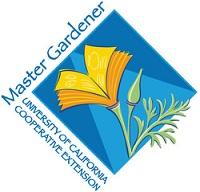
University of California
UC Master Gardener Program of Sonoma County
Nurture the Soil with Compost and Mulch
Nurturing garden soil is sometimes referred to as farming the soil with compost. Gardeners may think first about providing nutrients for plants but, just as important, is providing nutrients for the living ecosystem of microbiota in the soil.
- Compost made from kitchen and yard waste naturally sustains a complex habitat of microscopic soil organisms.
- These organisms break down organic matter—compost—into major and minor nutrients that in turn feed and sustain plants.
- Soil bacteria, fungi, and other unseen organisms function in concert with worms, beneficial insects, and a vast system of mycorrhizal fungal threads that attach to roots and promote nutrient uptake.
Regular applications of compost maintain long-lasting nutrient availability for plants that goes far beyond the temporary benefit of synthetic fertilizers.
- Withholding pesticides and herbicides and replenishing compost sustains key organisms and steady release of nutrients.
- Covering beds with 2-3 in. of organic mulch increases the retention of compost and moisture.
- Mulch, also consumed by soil organisms, slowly breaks down into compost.
- Replacing mulch every year or two, or as needed, helps retain air and moisture in beds and prevents weed growth.
DO:
- Compost on site by recycling your own food and garden scraps.
- Lightly incorporate organic matter into garden beds.
- Avoid deep digging that destroys microbiotic ecosystems.
- Minimize erosion and conserve soil moisture with mulch.
DON’T:
- Use synthetic, quick release fertilizers or pesticides that easily leach away and also destroy microbes.
- Till garden beds; instead, scratch compost into the top few inches of soil.
- Compact soil by walking on beds and driving out air needed by microbiota.
Additional Information
- Enriching Garden Soil
- Compost for the Garden
- Mulch
- https://ucanr.edu/sites/soils/Soils_for_Homes_-_Gardens/.
November 2022







